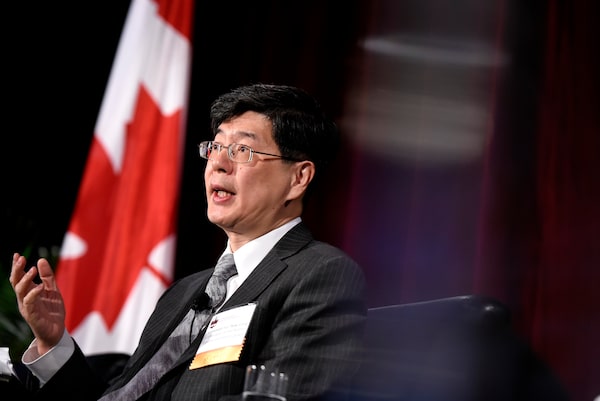
China’s ambassador to Canada, Cong Peiwu in Ottawa on March 4, 2020, has defended China's new national security law imposed on Hong Kong.Justin Tang/The Canadian Press
Canada’s top diplomat in Hong Kong says Ottawa has drawn up exhaustive plans for a mass evacuation of citizens from Hong Kong, if necessary, but added he can’t help local activists should they try to seek asylum at the consulate.
About 300,000 Canadian citizens live in Hong Kong and fears persist that a new security law unilaterally imposed on the former British colony by Beijing could endanger their safety.
The measures, enacted June 30, criminalize dissent and opposition and violate a treaty the Chinese government signed to leave civil liberties untouched for 50 years after Hong Kong was handed over to Beijing.
Speaking to the House of Commons special committee on Canada-China relations, Jeff Nankivell, the country’s consul-general in Hong Kong, said Canada is ready to bring home citizens if the need arises.
“We do have detailed plans in place and we have resources available and identified to cover a range of situations up to, and including, a situation where the urgent departure of a large number of Canadians would be necessary,” the consul-general told MPs. He said Canada has “plans to bring in other resources" depending on the circumstances.
“The likelihood of that kind of extreme scenario appears right now to be low but it’s our job to plan for the most extreme situations.”
One problem facing Hong Kongers trying to flee is pandemic travel restrictions prevent them from boarding an aircraft bound for Canada. Before COVID-19, they could travel to Canada as a tourist and ask for asylum upon arrival – but not any more. They are fearful of declaring their intention to seek asylum while in Hong Kong, where they could be monitored, or are being watched by police or already face charges for pro-democracy demonstrations.
Asked whether he would take in asylum seekers at the consulate located in Hong Kong’s Quarry Bay district, the Canadian diplomat said his hands are tied.
“The global policy of Canada, similar to most other countries, is that our diplomatic missions, including consulates, do not accept applications of asylum at our offices from people who are in their own territory.”
He said that no asylum seekers have shown up at the consulate to make a claim, but if any did, “we would provide them with the information about how the system works in Canada, but we are not a position to welcome them inside.”
Mr. Nankivell said would-be refugees can always make a claim in third countries. But, he acknowledged, the territory’s exit controls could thwart some Hong Kongers' efforts to leave.
Cherie Wong, executive director with Alliance Canada Hong Kong, an umbrella group for pro-democracy Hong Kong organizations, said in an interview some wanting to leave the former British colony are relatives of Canadians but not citizens.
“It is a positive sign that the consulate acknowledges the potential for a mass evacuation of Canadians if the situation worsens, but it is imperative to remember that family members of Canadians may not be Canadian citizens themselves,” Ms. Wong said. “There is desperation from activists as many consider risker and risker options … many will require specialized support from the consulate due to having been arrested, being deemed a flight risk and having their travel documents confiscated,” she said.
Separately, speaking to the University of Toronto’s Munk School of Global Affairs and Public Policy in an online event Monday, China’s ambassador to Canada, Cong Peiwu, defended new national security law imposed on Hong Kong.
Mr. Cong said the controversial security law is necessary to deal with violent protesters; he argued that it has been a success.
"The central government has to take measures that restore the rule of law and the social order and that’s why we have this national security law in place,” he said. “We have seen Hong Kong is becoming more stable and safer and we have a larger number of capital inflow into Hong Kong and that’s all the evidence pointing to the importance of the implementation of the new security law.”
Charles Burton, a former diplomat and senior fellow at the Macdonald-Laurier Institute, noted that Mr. Cong has so far declined to appear before Commons committee on Canada-China relations – but was given top billing at the Munk School.
“Certainly no Canadian ambassador to China would be allowed such a platform,” he said, adding the Munk School should also provide an opportunity for Uyghur and Hong Kong democracy activists to rebut Mr. Cong.
Mr. Cong also defended Beijing’s crackdown on Muslim Uyghurs and other minorities in its northwestern Xinjiang region, where up to one million people have been held in detention camps and where China is accused of ethnic cleansing.
Mr. Cong said China is merely responding to threats of terrorism; he denied genocide has been taking place.
“It is about fighting terrorism, and separatism and extremism and is purely China’s internal affairs.”
Last month, a Commons committee issued a statement, calling government-run detention facilities “concentration camps” and urging Canada to not only condemn China’s actions in Xinjiang, but recognize they constitute genocide.
Our Morning Update and Evening Update newsletters are written by Globe editors, giving you a concise summary of the day’s most important headlines. Sign up today.
 Steven Chase
Steven Chase Robert Fife
Robert Fife